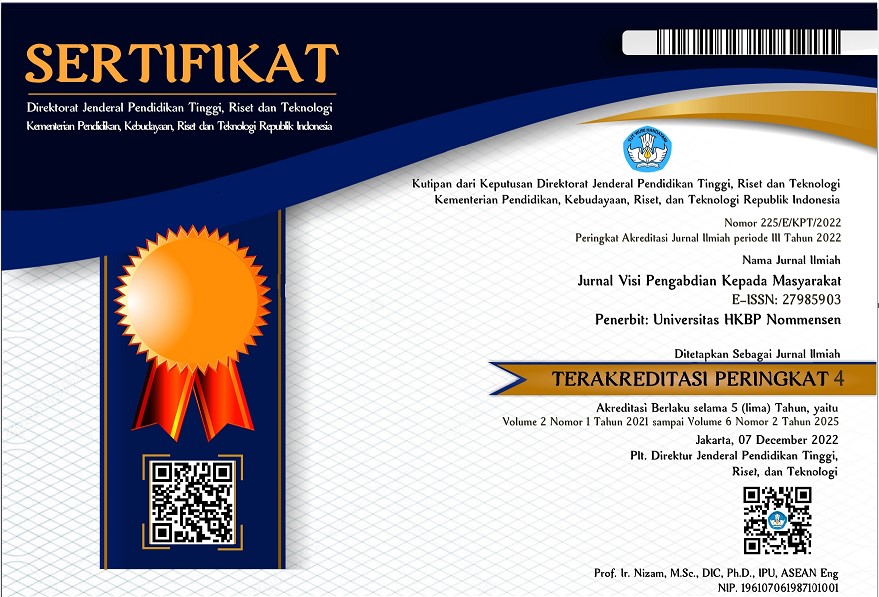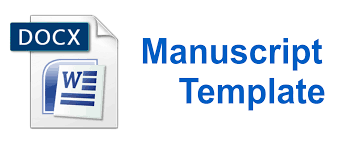Pelatihan Restrukturisasi Pendahuluan untuk Publikasi Jurnal Internasional Bereputasi
DOI:
https://doi.org/10.51622/pengabdian.v5i1.2004Keywords:
Pelatihan scopus, menyusun pendahuluan scopus, pelatihan manuskrip scopus, restrukturisasi pendahuluanAbstract
Pengabdian ini bertujuan untuk meningkatkan pengetahuan dan keterampilan penulis dalam menyusun pendahuluan pada 9 orang mahasiswa (awardee). Tim mengaplikasikan empat fitur/ indikator penyusunan pendahuluan untuk mengatasi masalah partisipan, masing-masing, 1) perkembangan variabel studi dan dampak kebermanfaatannya bagi perkembangan ilmu pengetahuan dan teknologi, 2) eksplorasi variabel masalah yang penulis jumpai dalam studinya dan dampak negatifnya, 3) mengkaji studi-studi terdahulu yang telah berupaya mengatasi variabel masalah dan apa kesenjangannya atau kelemahannya, serta 4) kontribusi atau variabel solusi dan signifikansinya yang penulis tawarkan serta diakhiri tujuan studi. Transfer ke-empat teknologi tersebut menggunakan metode ceramah dan diskusi, latihan dan revisi, serta presentasi dan pendampingan. Keberhasilan pengabdian diukur (pre-test-post-test) menggunakan 4 pernyataan tertutup yang dikembangkan dari keempat fitur materi. Hasil analisis deskriptif dan N-gain menemukan bahwa terjadi peningkatan setelah partisipan mengikuti pelatihan (kategori N-gain = sedang; 0.3 <0.7). Dari basis data fitur, maka peningkatan tertinggi terjadai pada fitur ketiga. Sedangkan dari basis data partisipan, maka partisipan pertama dan terakhir, yang memiliki peningkatan tertinggi. Meskipun demikian, keempat fitur tersebut dikembangkan dari pengalaman empiris dan reflektif dari fasilitator, sehingga para partisipan masih perlu mengujicobakan dengan mengajukan manuskripnya ke jurnal internasional bereputasi. Keberhasilan partisipan menerbitkan di jurnal internasional bereputasi sebagai bentuk ekperimentasi nyata dari keberhasilan pengabdian ini.Downloads
References
Abidin, N. A. Z., Masek, A., Faiz, N. S. M., & Sahdan, S. (2018). Exploring the elements of integrity in peer assessment. MATEC Web of Conferences, 150, 05002. https://doi.org/10.1051/matecconf/201815005002
Academic Integrity Project. (2013). Embedding and extending exemplary academic integrity policy and support frameworks across the higher education sector: Plain English definition of academic integrity. Office for Learning and Teaching Strategic Commissioned Project.
Almutairi, Y. M. N. (2022). Effects of academic integrity of faculty members on students’ ethical behavior. Education Research International, 2022, 6806752. https://doi.org/10.1155/2022/6806752
Armagan, A. (2014). How to write an introduction section of a scientific article? Türk Üroloji Dergisi/Turkish Journal of Urology, 39(1), 8–9. https://doi.org/10.5152/tud.2013.046
ArwaArna’out. (2016). Academic integrity issues: Benefits, challenges, initiatives and practices. International Journal of Social Sciences & Education, 6(1), 8–21. http://ijsse.com/sites/default/files/issues/2016/v6i1/paper-02.pdf
Ayoub/Al-Salim, M. I., & Aladwan, K. (2021). The relationship between academic integrity of online university students and its effects on academic performance and learning quality. Journal of Ethics in Entrepreneurship and Technology, 1(1), 43–60. https://doi.org/10.1108/jeet-02-2021-0009
Bahadoran, Z., Jeddi, S., Mirmiran, P., & Ghasemi, A. (2018). The principles of biomedical scientific writing: Introduction. International Journal of Endocrinology and Metabolism, 16(4), e84795. https://doi.org/10.5812/ijem.84795
Bashir, H., & Bala, R. (2018). Development and validation of Academic Dishonesty Scale (ADS): Presenting a multidimensional scale. International Journal of Instruction, 11(2), 57–74. https://doi.org/10.12973/iji.2018.1125a
Bavdekar, S. B. (2015). Writing introduction: Laying the foundations of a research paper. J Assoc Physicians India, 63(7), 44–46.
Belt, P., Mottonen, M., & Harkonen, J. (2011). Tips for writing scientific journal article (1st ed.). University of Oulu.
Blegur, J., Subarjah, H., Hidayat, Y., Ma’mun, A., Mahendra, A., Mahardika, I. M. S., & Hardiansyah, S. (2024). Peer-Assessment Academic Integrity Scale (PAAIS-24). Emerging Science Journal.
Blegur, J., & Tlonaen, Z. A. (2022). Sharing-session and clinic strategi menyusun proposal penelitian dosen pemula. MARTABE: Jurnal Pengabdian Masyarakat, 5(4), 1530–1545. https://doi.org/10.31604/jpm.v5i4.1530-1545
Blegur, J., Tlonaen, Z. A., & Rosari, R. (2023). Pelatihan analisis bibliometrik menggunakan aplikasi Publish or Perish dan VOSviewer untuk publikasi ilmiah. Jurnal Abdimas Prakasa Dakara, 3(2), 83–101. https://doi.org/10.37640/japd.v3i2.1843
Brown, T., Isbel, S., Logan, A., & Etherington, J. (2020). Predictors of academic integrity in undergraduate and graduate-entry masters occupational therapy students. Hong Kong Journal of Occupational Therapy, 33(2), 42–54. https://doi.org/10.1177/1569186120968035
Cardina, Y., Kristiani, & Sangka, K. B. (2022). Qualitative survey of academic dishonesty on higher education: Identify the factors and solutions. Journal of Positive School Psychology, 6(3), 8705–8719. https://www.journalppw.com/index.php/jpsp/article/view/5181
Cook, C., Brismee, J.-M., Courtney, C., Hancock, M., & May, S. (2009). Publishing a scientific manuscript on manual therapy. The Journal of Manual & Manipulative Therapy, 17(3), 141–147. https://doi.org/10.1179/jmt.2009.17.3.141
Cutri, J., Abraham, A., Karlina, Y., Patel, S. V., Moharami, M., Zeng, S., Manzari, E., & Pretorius, L. (2021). Academic integrity at doctoral level: The influence of the imposter phenomenon and cultural differences on academic writing. International Journal for Educational Integrity, 17(1), 8. https://doi.org/10.1007/s40979-021-00074-w
Ecarnot, F., Seronde, M. F., Chopard, R., Schiele, F., & Meneveau, N. (2015). Writing a scientific article: A step-by-step guide for beginners. European Geriatric Medicine, 6(6), 573–579. https://doi.org/10.1016/j.eurger.2015.08.005
Fishman, T. (2014). The fundamental values of academic integrity (2nd ed.). International Center for Academic Integrity.
Gallant, T. B., & Rettinger, D. (2022). An introduction to 30 years of research on academic integrity. Journal of College and Character, 23(1), 1–5. https://doi.org/10.1080/2194587x.2021.2017975
Hake, R. R. (1999). Analyzing change/gain scores. American Educational Research Association’s, Measurement and Research Methodology.
Harp, J., & Taietz, P. (1966). Academic integrity and social structure: A study of cheating among college students. Social Problems, 13(4), 365–373. http://www.jstor.org/stable/798585
Henning, M. A., Abaraogu, U. O., Ram, S., Malpas, P., & Hawken, S. J. (2016). Developing a Cross-Cultural Academic Integrity Questionnaire for medical and health sciences students. Medical Science Educator, 26(4), 581–586. https://doi.org/10.1007/s40670-016-0302-3
Henning, M. A., Alyami, M., Melyani, Z., Alyami, H., & Al Mansour, A. (2020). Development of the Cross-Cultural Academic Integrity Questionnaire - Version 3 (CCAIQ-3). Journal of Academic Ethics, 18(1), 35–53. https://doi.org/10.1007/s10805-019-09350-4
Holden, O. L., Norris, M. E., & Kuhlmeier, V. A. (2021). Academic integrity in online assessment: A research review. Frontiers in Education, 6, 639814. https://doi.org/10.3389/feduc.2021.639814
Hoogenboom, B. J., & Manske, R. C. (2012). How to write a scientific article. The International Journal of Sports Physical Therapy, 7(5), 512–517.
İlhan, A., Poçan, S., & Aslaner, R. (2023). Microteaching and peer assessment in mathematics teaching practice. Brock Education Journal, 32(2), 29–57. https://doi.org/10.26522/BROCKED.V32I2.992
International Centre for Academic Integrity. (2021). Fundamental values of academic integrity (3rd ed.). International Centre for Academic Integrity. https://academicintegrity.org/images/pdfs/20019_ICAI-Fundamental-Values_R12.pdf
Lancaster, T. (2021). Academic dishonesty or academic integrity? Using Natural Language Processing (NLP) techniques to investigate positive integrity in academic integrity research. Journal of Academic Ethics, 19(3), 363–383. https://doi.org/10.1007/s10805-021-09422-4
Macfarlane, B., Zhang, J., & Pun, A. (2014). Academic integrity: A review of the literature. Studies in Higher Education, 39(2), 339–358. https://doi.org/10.1080/03075079.2012.709495
Maryon, T., Dubre, V., Elliott, K., Escareno, J., Fagan, M. H., Standridge, E., & Lieneck, C. (2022). COVID-19 academic integrity violations and trends: A rapid review. Education Sciences, 12(12), 901. https://doi.org/10.3390/educsci12120901
McHaney, R., Cronan, T. P., & Douglas, D. E. (2016). Academic integrity: Information systems education perspective. Journal of Information Systems Education, 27(3), 153–158. https://aisel.aisnet.org/cgi/viewcontent.cgi?article=1071&context=jise
Miron, J., Eaton, S. E., McBreairty, L., & Baig, H. (2021). Academic integrity education across the Canadian higher education landscape. Journal of Academic Ethics, 19(4), 441–454. https://doi.org/10.1007/s10805-021-09412-6
Morris, E. J. (2018). Academic integrity matters: Five considerations for addressing contract cheating. International Journal for Educational Integrity, 14(1), 15. https://doi.org/10.1007/s40979-018-0038-5
Musau, P. (2018). Academic dishonesty in medical schools. Annals of African Surgery, 14(1), 19–21. https://doi.org/10.4314/aas.v14i1.4
Nundy, S., Kakar, A., & Bhutta, Z. A. (2022). How to practice academic medicine and publish from developing countries? A practical guide. Springer. https://doi.org/https://doi.org/10.1007/978-981-16-5248-6_17
Özmercan, E. E., Polat, B., & Nartgün, Z. (2022). Psychometric properties of Academic Dishonesty Tendency Scale for graduate students and investigating academic dishonesty tendency levels with CHAID analysis. Journal of Measurement and Evaluation in Education and Psychology, 13(1), 86–104. https://doi.org/10.21031/EPOD.1022731
Pérez, M. C. I., Vidal-Puga, J., & Juste, M. R. P. (2022). The role of self and peer assessment in higher education. Studies in Higher Education, 47(3), 683–692. https://doi.org/10.1080/03075079.2020.1783526
Ramdani, Z. (2018). Construction of Academic Integrity Scale. International Journal of Research Studies in Psychology, 7(1), 87–97. https://doi.org/10.5861/ijrsp.2018.3003
Saana, S. B. B. M., Ablordeppey, E., Mensah, N. J., & Karikari, T. K. (2016). Academic dishonesty in higher education: students’ perceptions and involvement in an African institution. BMC Research Notes, 9(1), 234. https://doi.org/10.1186/s13104-016-2044-0
Salamah, I., & Kusumanto, R. (2022). Factors influencing academic dishonesty among Sriwijaya State Polytechnic students. International Journal of Science, Science, Technology & Management, 3(2), 357–362. https://doi.org/10.46729/ijstm.v3i2.491
Sanni-Anibire, H., Stoesz, B. M., Gervais, L., & Vogt, L. (2021). International students’ knowledge and emotions related to academic integrity at Canadian postsecondary institutions. International Journal for Educational Integrity, 17(1), 21. https://doi.org/10.1007/s40979-021-00088-4
Scholz, F. (2022). Writing and publishing a scientific paper. ChemTexts, 8(1), 8. https://doi.org/10.1007/s40828-022-00160-7
Sitompul, K. S., & Anditasari, A. W. (2022). Challenges in writing academic research: An exploration of master’s students’ experiences. Getsempena English Education Journal, 9(2), 136–148. https://doi.org/10.46244/geej.v9i2.1805
Stone, A. (2022). Student perceptions of academic integrity: A qualitative study of understanding, consequences, and impact. Journal of Academic Ethics, 1–19. https://doi.org/10.1007/s10805-022-09461-5
Tauginienė, L., Gaižauskaitė, I., Razi, S., Glendinning, I., Sivasubramaniam, S., Marino, F., Cosentino, M., Anohina-Naumeca, A., & Kravjar, J. (2019). Enhancing the taxonomies relating to academic integrity and misconduct. Journal of Academic Ethics, 17(4), 345–361. https://doi.org/10.1007/s10805-019-09342-4
Thomas, G., Martin, D., & Pleasants, K. (2011). Using self- and peer-assessment to enhance students’ future-learning in higher education. Journal of University Teaching and Learning Practice, 8(1), 52–69. https://doi.org/10.53761/1.8.1.5
Turbek, S. P., Chock, T., Donahue, K., Havrilla, C., Oliverio, A., Polutchko, S., Shoemaker, L., & Vimercati, L. (2016). Scientific writing made easy: A step-by-step guide to undergraduate writing in the biological sciences. International Journal of Environmental and Science Education, 11(12), 417–426. https://doi.org/10.1002/bes2.1258
Werner, J. M. (2022). Academic integrity and human resource development: Being and doing. Human Resource Development Review, 21(2), 249–257. https://doi.org/10.1177/15344843221078505
Winardi, R. D., Mustikarini, A., & Anggraeni, M. A. (2017). Academic dishonesty among accounting students: Some Indonesian evidence. Jurnal Akuntansi Dan Keuangan Indonesia, 14(2), 142–164. https://doi.org/10.21002/jaki.2017.08
Yin, S., Chen, F., & Chang, H. (2022). Assessment as learning: How does peer assessment function in students’ learning? Frontiers in Psychology, 13, 912568. https://doi.org/10.3389/fpsyg.2022.912568
Zhao, L., Mao, H., Compton, B. J., Peng, J., Fu, G., Fang, F., Heyman, G. D., & Lee, K. (2022). Academic dishonesty and its relations to peer cheating and culture: A meta-analysis of the perceived peer cheating effect. Educational Research Review, 36, 100455. https://doi.org/10.1016/j.edurev.2022.100455
Published
How to Cite
Issue
Section
Copyright (c) 2024 Jusuf Blegur, Marleni, Piki Setri Pernantah

This work is licensed under a Creative Commons Attribution 4.0 International License.












